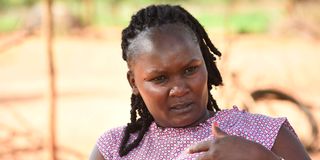Exhuming bodies to 'face the cut': The lies that bind West Pokot families to FGM

Domtila Chesang, founder of I am Responsible (Irep), which is fighting to end female genital mutilation in West Pokot County.
What you need to know:
- On Tuesday last week, Kenya marked the International Day of Zero Tolerance for Female Genital Mutilation (FGM).
- The government had committed to eradicating FGM by the end of 2022, but that was not achieved.
On Tuesday last week, Kenya marked the International Day of Zero Tolerance for Female Genital Mutilation (FGM).
The Uhuru Kenyatta administration had committed to eradicating the practice by the end of 2022, but that was not achieved.
Nevertheless, overall FGM prevalence has dropped. The 2022 Kenya Demographic and Health Survey shows that the rates had dropped to 15 per cent from 21 per cent in 2014.
According to the United Nations International Children's Emergency Fund, 35 communities practise FGM in Kenya. Forty-five ethnic groups and nine non-Kenyan are listed in the 2019 Census.
These 35 communities are spread across 22 FGM hotspot counties, namely Kajiado, Narok, Samburu, Laikipia, Migori, Kisii, Nyamira, Meru, Embu, Mandera, Wajir, Garissa, Tana River and West Pokot.
The others are Baringo, Elgeyo Marakwet, Isiolo, Marsabit, Bungoma, Bomet, Taita Taveta and Tharaka Nithi.
While the myths around FGM may vary across the counties, one factor remains constant: FGM is intended at controlling a woman’s or a girl’s sexuality.
In an earlier interview with Sadia Hussein, an anti-FGM campaigner in Tana River County, she said her grandmother and mother told her that going through the cut would make her ‘complete’. Her grandmother later mutilated her.
In the case of Aisha Roba from Isiolo County, she willingly went for the cut out of the pressure to identify with other girls in her Borana community.
Such are the lies women and girls are told to indisputably accept FGM.
Domtila Chesang', the founder of West Pokot-based I am Responsible Foundation, shares even more shocking events attached to the lies held about the procedure.
That in West Pokot dead women are cut before they are buried to align with the tradition. And the bodies already interred without the cut are secretly exhumed for the cut then returned to the grave.
“There is an obsession around FGM [that is unimaginable],” she tells Nation.Africa.
“There is a belief that the ancestors will haunt the family if it buries a woman who has not been cut.”
Girls are also told traditional birth attendants will not deliver their babies if they are not cut.
“The community believes that the blood of a girl who has not been cut is so powerful that a traditional birth attendant can go blind or die,” she says.
With the instilled fear and reality that they will deliver at home since hospitals are situated miles away, girls are pressed into submission.
In other instances, the girls are told that if not ‘pruned’, the clitoris will grow too long that it will compete with the penis, she says. Or that “it will grow branches.”
“The girls are also told their private parts will smell if they are not cut. In fact, if an uncut girl passes by, you will hear those who have been cut say ‘what’s that smell?’ Yet she isn’t smelling.”





